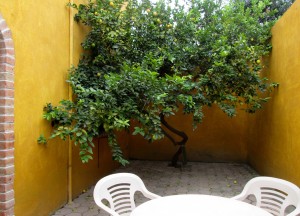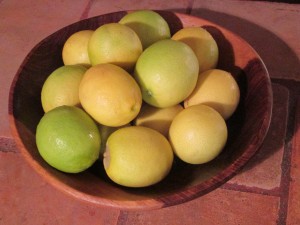I used to joke that the words chiseled on my tombstone would read, “When you have a lemon, make a lemonade.” It’s a tired maxim, I know, but nevertheless helpful, I’ve found, on my life’s journey.
The expression really came to life for me when I was in the Peace Corps in Gabon, Central Africa, 20 years ago. On one of my solo, exploratory afternoon walks, I came across a long-abandoned and surprisingly hidden orchard filled with rows of neglected old lemon trees. The lemons dangling from these trees were unlike any I’d ever seen in my ten-year culinary career in Manhattan. They were large for lemons, with thick, lumpy skin. They were ugly looking, really, except for their bright yellow color, but relatively sweet and beautifully juicy inside. I helped myself to a backpack-full and brought them to my next cooking class for local women.
“Look, my sisters,” I enthused in French to the gathering of African women anxious to learn my newest easy and affordable recipe, “this is how to make lemonade!”
I halved a half dozen or so lumpy lemons, squeezed them into a plastic pitcher, added clear, cold, potable water and some table sugar, and stirred with a wooden spoon. Then I gave them all a taste, their first-ever taste of lemonade. Each woman, in turn, smiled and nodded approvingly.
“This drink is much better for you and your family than Coca Cola,” I said, knowing how popular the super-sugary bottled drink was there, “and a lot cheaper too. The lemons are free!”
I also suggested that they save the lemon seeds and plant them near their homes. Since the interior of Gabon, where we were, is a thick rainforest, I suspected they might have good luck growing their own lemon trees. Although these African women were truly poor by “First World” measures, I trusted that soon enough they’d be happily turning lemons into delicious and healthy lemonade.
I remembered this lemons-to-lemonade story yesterday when, for the first time since my arrival in San Miguel de Allende, Mexico, a few days ago, I had lunch outside at the patio table. This small, walled-in patio is sun-filled at midday and just large enough for a scarlet bougainvillea climbing the wall on one side, a round table with four surrounding chairs in the center, and, on the other side, a big, old lemon tree, dripping with ripe and not-yet-ripe fruit.

When I came for the first time to look at this one-year sublet and saw the regal lemon tree, I knew I had to live here. I’m convinced I could be happy anywhere in the world where lemon trees thrive.
This morning I took a break from unpacking and settling in to climb a ladder and pick a bowlful of lemons. Then I photographed them:
Shakespeare wrote in As You Like It about “sermons in stones.” I see sermons in these lemons. Instead of wallowing (as I could so easily do) in loss and fear and worry, as a single, self-supporting 70-year-old American woman unable to afford to retire in the good ol’ USA, I’ve chosen to live simply and affordably in Mexico, where lemon trees grow.
If I were to elaborate on the financial hardships faced by middle-class Americans these days, especially single, self-supporting older women like myself who have worked and tried to save for the future all of our adult lives, I fear I’d sound lemon-sour, or perhaps unpatriotic, or maybe – God forbid — whiney. I don’t want to do that.
Instead, I’ll relate a life-altering lesson I learned in Africa: There is a positive, creative solution to every seemingly intractable problem.
And I’ll gratefully celebrate my new home with its lemon tree here in sunny-and-warm Mexico and joyfully drink refreshing homemade lemonade every day.
# # #
(For the full story about teaching cooking and health in Gabon, please read my Peace Corps memoir, HOW TO COOK A CROCODILE.)

